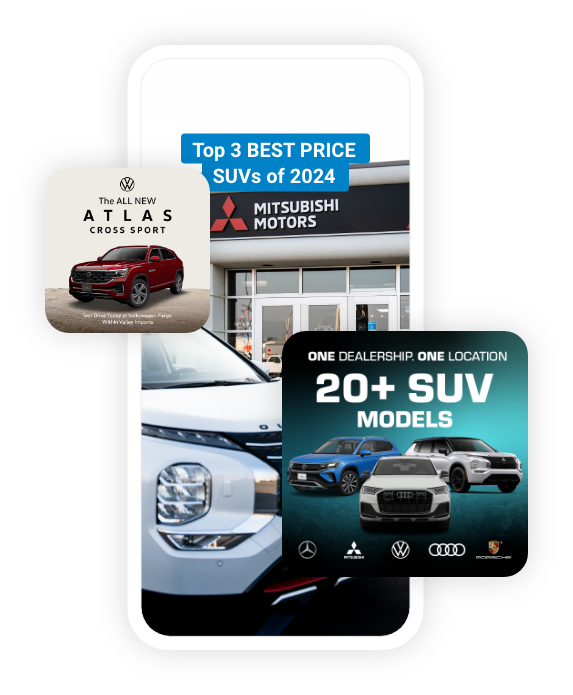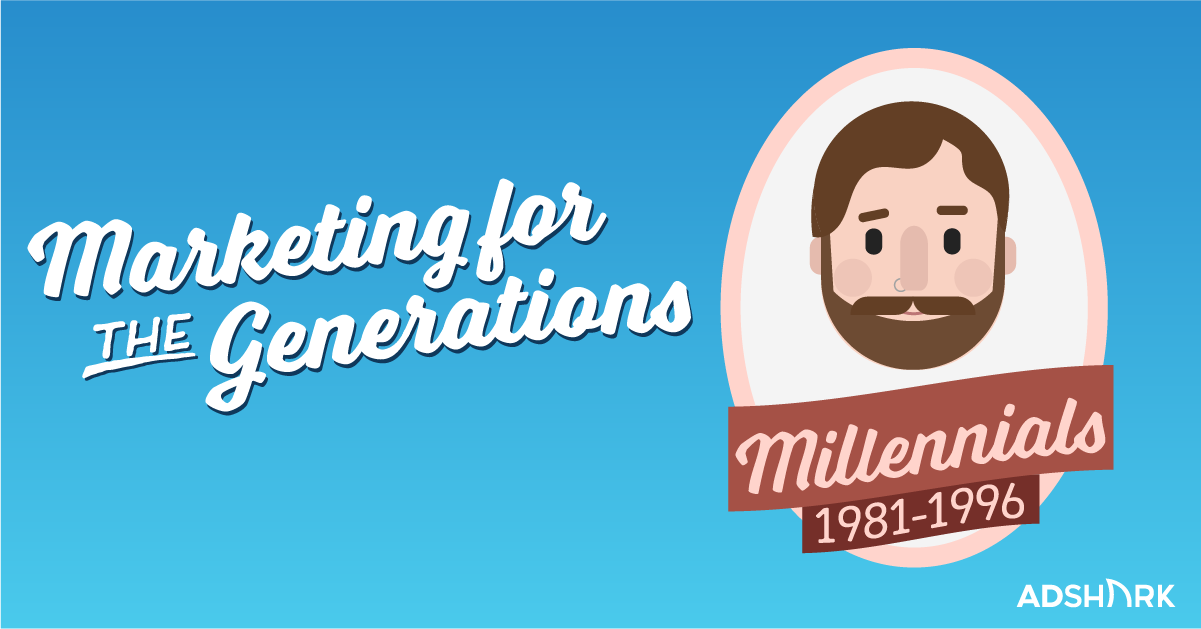Marketing to Millennials: Why You Should Rethink What You’re Doing
Marketing to Millennials has been a key focus for brands for many years. Previously holding the title of the biggest generation in America, marketers have tried zeroing in to understand and reach them with targeted ads and messages. Unfortunately, being popular lends itself to more criticism and stereotypes.
If you’ve come to our blog to validate negative stereotypes or gripe about this generation, then you’ve come to the wrong place. We want to focus on the statistics and experiences that have formed this generation’s behaviors toward advertising and brand interactions.
We are not trying to make blanket statements about a group of people based solely on the year they were born. However, we are making observations of behaviors that are prevalent enough to use for targeting the right audience and developing the right message for your brand. For example:
- Millennials make up 22% of the U.S. population
- Millennials are parents to 50% of today’s children.
- They are the most cash-strapped generation today.
Who are Millennials, really?
The oldest Millennials were born the same year MTV first went on air with, “Video Killed the Radio Star,” by The Buggles, while the last of the generation was born the year Google started indexing the web.

Pew Research defines Millennials as anyone born from 1981-1996—making them 24-39 years old as of 2020.
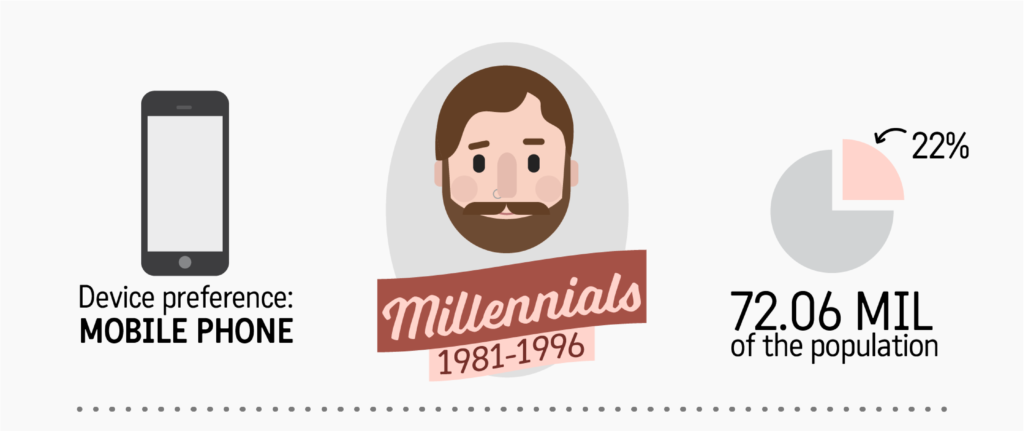
Events That Shaped Millennial’s Lives
Millennials came of age during the Dot-com bubble, 9/11 terrorist attacks, the advent of social media and the height of reality TV.
Growing up at the height of the Great Recession, Millennials graduated college with more student debt than any other generation, a slow job market and high cost of living—leaving them financially behind.
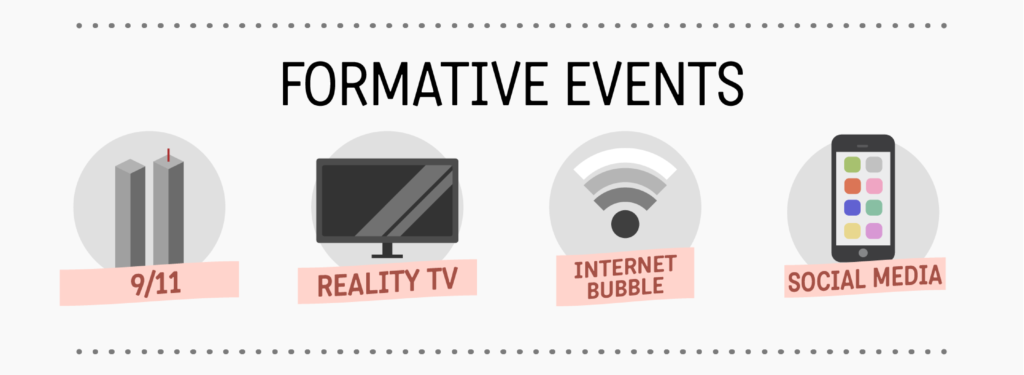
Millennial Character Traits
Millennials are often characterized as independent, adventurous, open-minded and entrepreneurial. This is the first generation to grow up without technology but had access to it young enough to become technologically savvy.

Most people still correlate the Millennial generation with being young and immature. However, the youngest of the generation is now 24 and has been out of college for a couple of years. In fact, Millennials are parents to 50% of today’s children—making them a valuable audience to brands that want to reach kids.
Millennials Value Experiences Over Things
For most millennials, possessions don’t mean anything. They are no longer the status symbols they used to be. Instead, Millennials are forgoing expensive purchases to save for travel and hobbies. And the reason, it makes them happier—data shows that experiences elicit more happiness than buying material things.
Millennials Work Smarter Not Harder
Millennials place a big emphasis on productivity. They are not happy with the technology available in the workplace and feel that businesses aren’t keeping up with the times. They want the ability to collaborate with collogues, work remotely, and stop using so much paper. From a brand perspective, focus your message on how your product can increase a Millennial’s productivity.
Millennials Are Open to Innovative Marketing
Unlike the older generations, Millennials use their time online as a source to connect with the world around them. Overall, they see the Internet as a positive thing and don’t mind digital advertising. They do however despise traditional advertising.
As long as the content feels authentic, is entertaining and useful—and of course not too long—millennials don’t mind sponsored content like written features or pre-roll video.
Millennials are Broke
As mentioned above, Millennials have much less money than their parents did at their age. And they recognize this. So, they spend less on unnecessary things. They will, however, spend their money on products with longevity, brands that promote corporate citizenship and products that save them time or improve their productivity.
Millennials Are Busy
Millennials are quickly becoming the burnout generation. They are workaholics who don’t have free time to do life’s mundane tasks—which reflects as them being “lazy” and “entitled”. What it really means is that they just don’t have time. And are looking for brands to make their lives easier and meet their needs faster. If there is a subscription service, they will subscribe. If a brand has same-day shipping, they will pay for it. Marketing to this generation should be focused on the value a brand can bring and how the brand can make their life easier and more productive.
Millennials Are Socially Conscious
Just like Gen Z, 73% of Millennials are willing to pay more for sustainable brands. If you want to attract the Millennial generation to your brand, look at your impact on the environment and the world.
Examples of brands that have great corporate social responsibility include REI and Ben & Jerry’s.
Millennials and Technology
Millennials lead the older generations in the adoption of technology. According to Pew Research, 93% of millennials own smartphones and 86% say they use social media.
Their main uses of the internet are for convenience and improving their quality of life, along with networking and entertainment. And because they see the internet as a positive thing, they are more apt to accept new technology or trust what they see or read online. So, what does their activity online have to do with brands and marketing? We walk through a few activities millennials do that brands need to keep in mind online.
Millennials use Technology to Research Brands and Products
While Millennials are glued to their phones, they are actually using them to research products. 90% of Millennials research products online, while 60% use a smartphone when researching a product. This aligns with the stat that 81% of buyers are using digital sources to research BEFORE contacting or connecting with a brand. And many buyers are more than half their way through a purchasing decision when they finally make contact.
Millennials and Social Media
Myspace and Facebook came around when the oldest Millennials were in college, so they were by and large the earliest adopters. If you’re looking for ways to connect with Millennials on social media, understanding their language and how they use each platform is critical to your success.

The most popular social media channels for Millennials include Facebook, YouTube, Instagram, Snapchat, Twitter, and Pinterest. They are using these channels for networking and entertainment. And unlike other generations, they’ve grown up with ads tailored to their interests, so they’ve come to expect it on social channels. In fact, if they find the branded content relevant, they are more likely to try it out than other generations.
What Are My Options for Marketing to Millennials?
Generational marketing isn’t pushing stereotypes on an entire generation. No, we want you to use the information to help you improve the brand experience for your target audience. And knowing an age group’s understanding of technology and what they’ve experienced in their life gives you a better understanding of how to reach them. Here are some tips and ideas to get your brand thinking of how to market to the Millennial generation.
Places to Advertise

Like Gen Z, you need to start by meeting them where they are. Online, you can find Millennials primarily on Facebook, Instagram, Google, and YouTube. Connect your marketing funnel with their journey.
If you want to reach someone who isn’t familiar with your brand, but potentially researching products in your space use paid search.
If you want to connect with an audience who has already engaged with you, try retargeting them through video ads on Facebook and Instagram.
Writing your Ads
Since Millennials appreciate corporate social responsibility, brands should focus their ads on terms like “cruelty-free”, “sustainable” or “green”—if it applies.
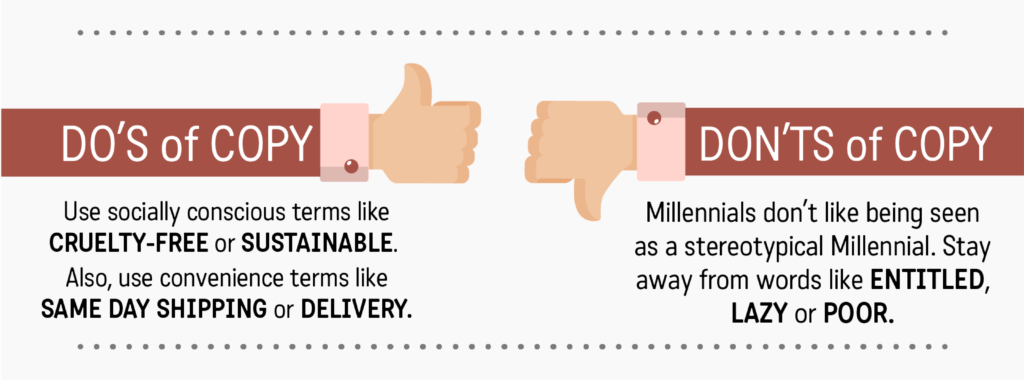
Another approach is to focus on convenience, terms like “same-day shipping” or “subscribe and save” highlights how your brand can quickly make their lives easier.
7 Tips for Marketing to Millennials
1. Convenience is key.
If I had to use one word to wrap this up into a nice, rounded bow it’s this—convenience. Find ways to be convenient and to help make Millennials’ lives more convenient. Some brands offer subscription services, some provide same-day shipping and others offer free pickup—bringing items purchased directly to your car. Finding ways to add value will give your brand an edge.
2. Use authentic and entertaining content.
Like Gen Z, millennials can see when a brand isn’t being fully transparent or authentic. Know who your brand is and stay true to that message with engaging and entertaining content. Millennials appreciate brands that provide relevant content through multiple channels. Brands that can create that content do well with this generation.
3. Content is king.
Millennials are researching online before purchasing more than any other generation. And even though they are a cash-strapped generation, they will buy products that they find value in. And the best way to prove your brand’s worth is by providing as much content online as possible. You don’t want your target audience getting 57% of the way through their buying journey only to turn around and purchase from your competitor because they offer the content that helps their buyer make a purchasing decision.
4. Traditional marketing may not work.
Millennials want connection and it shows with their purchasing behavior. Traditional marketing talks at you not with you. These types of campaigns typically focus on the brand and include generalized messages. Millennials know what they want and understand that brands can personalize messages to their needs. They want to be empowered to make choices, but they also want messages served to them to be relevant.
5. Support a cause.
Millennials are willing to pay more to purchase from brands that support causes they align with. Find a cause your organization cares about and include that as part of your brand story.
6. Get social proof.
Millennials trust reviews and recommendations—another similarity with Gen Z. Product reviews, company reviews, social media reviews, Google reviews… anywhere you can find brand advocates works. Spend some time and money investing in getting user reviews and user-generated content to improve conversions with Millennials.
7. Get on social media.
More than any other generation, Millennials use social media. And it’s not just one or two channels. Millennials like Facebook, YouTube, Instagram, Snapchat, Pinterest, and Twitter. So, if you want to reach them you need to incorporate those channels when marketing to Millennials. Focus on authentic and entertaining content to catch their interest.
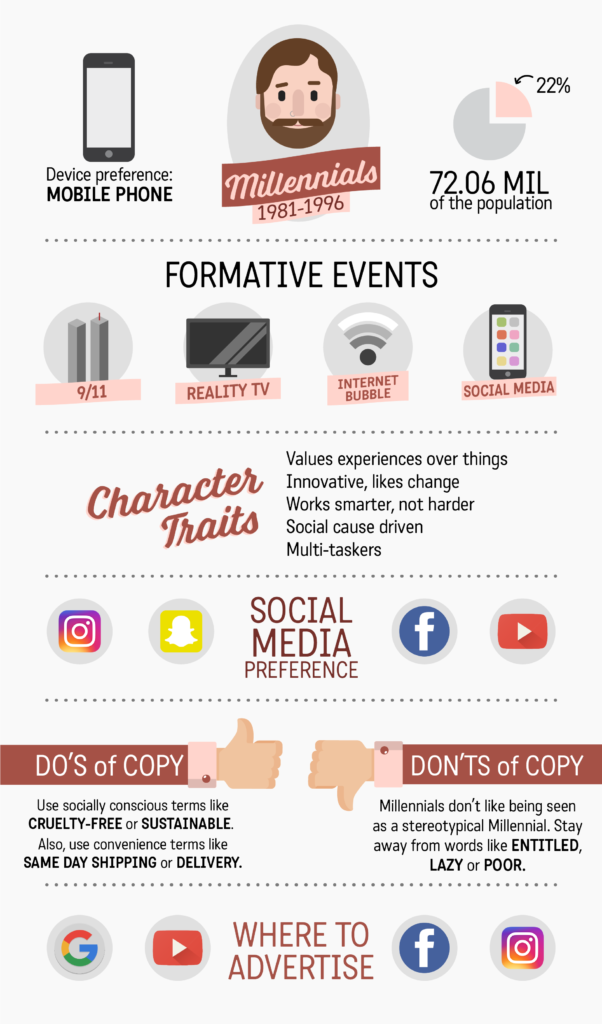
Millennials Are All Grown Up
It’s time for marketers to start realizing that Millennials are no longer the youngest generation. The oldest of the generation is closing in on 40, while the youngest is out of college and entering the workforce. They are busy and they are cash-strapped, but they still have huge buying power and will become brand loyalists if you have relevant, authentic and entertaining brand messaging.
How Can AdShark Marketing Help?
If you’re ready to start implementing digital marketing tactics in 2020, AdShark can help with your paid search and paid social campaigns. Give us a call and we will analyze what you’ve been doing and how to improve your results to grow your business.
Ready To Grow?
Let's Talk!
